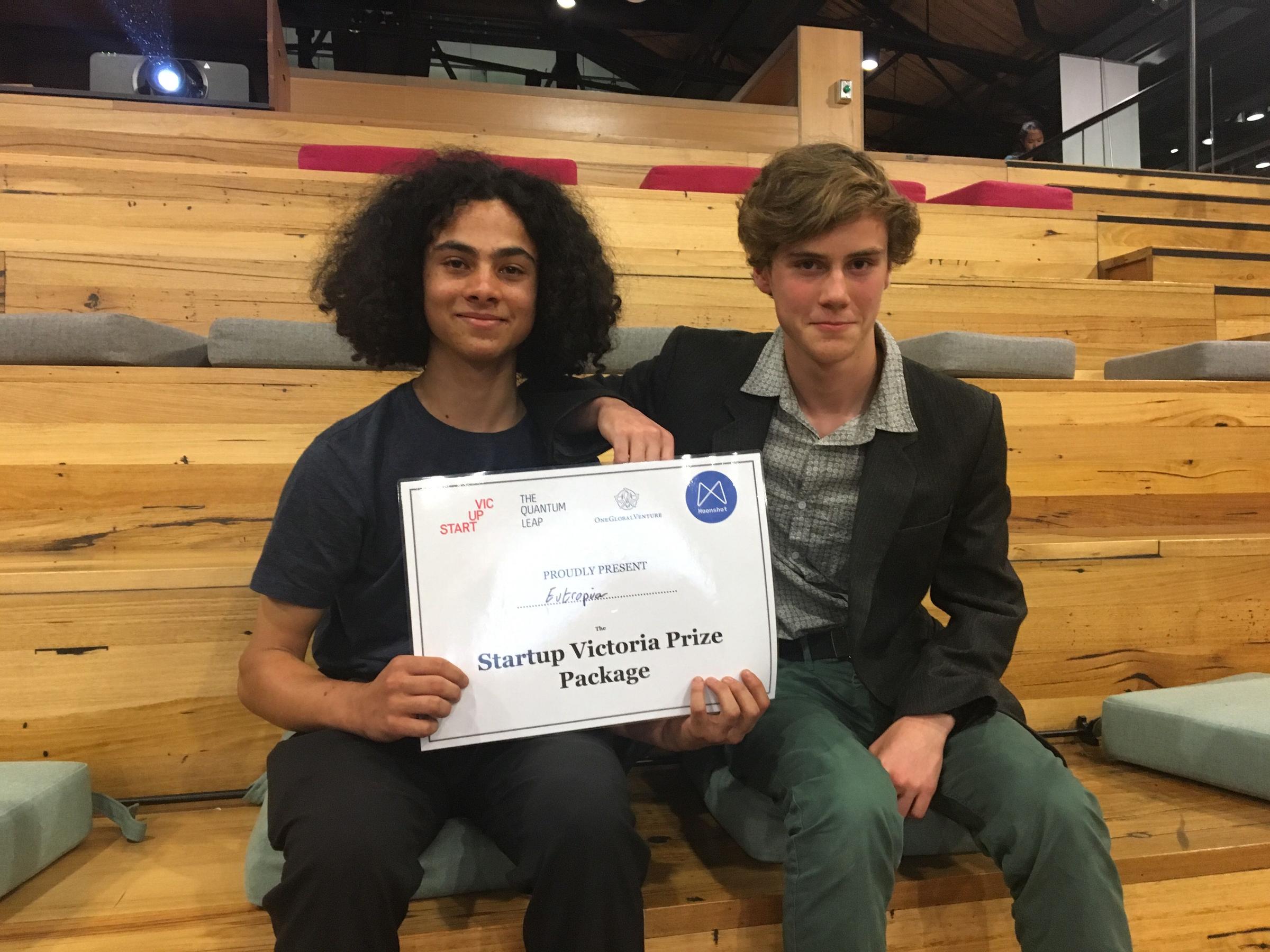EUTROPIA AEROSPACE CO-FOUNDERS
Image courtesy of StartupSmart.com.au

EUTROPIA AEROSPACE CO-FOUNDERS
Image courtesy of StartupSmart.com.au
Very exciting news for two of our Year 11 students and startup founders, Moses Huf-Tirfe and Hamish Drummond. They have taken home the top prize at Startup Victoria’s spacetech-themed pitch night, for their reusable, hybrid rocket technology. The following article by Stephanie Palmer-Derrien appeared in Start Up news via Smart Company on Tuesday 26 February.
"...Melbourne-based Eutropia Aerospace was founded by high-school students Moses Huf-Tirfe and Hamish Drummond, who pitched at the event, and co-founder Sam Wilson.
The startup combines reusable rockets with hybrid fuel — a cheaper option than traditional rocket fuel — to provide a more cost-effective way of getting microsatellites into orbit.
Modern rocketry is currently “extremely expensive and inaccessible”, Huf-Tirfe explained in the pitch.
“What needs to happen to rocketry is it needs to come down to earth”, he said.
The space and satellite industry is set to be worth $2.7 trillion by 2030, Drummond explained, and Australia is “one of the fastest-growing facets of this industry”, he said.
“We hope to be a superior player in the industry, and in the cubesat revolution, to make the internet, GPS and all of space better for everyone,” he added.
“An ‘Uber’ approach”
The startup began life as a school project, but the founders quickly realised they were on to something.
“When we got to the crux of it, we talked to people in the industry, and no one had really thought of this,” Drummond said.
“If there’s a market for it, and so many reasons for it to be a good idea and profitable, then why not start a business?”
In true startup style, they started building in a garage, taking what Huf-Tirfe called “an ‘Uber approach” of setting up first and asking permission later.
However, now the founders have big dreams to take on the space industry “with more passion, more determination and more brute force than any other startup has”, he added.
Already, the team has run 17 tests on its rockets, and they’re working on their next version, which Drummond claims “would be the cheapest per-kg launch system in the world”.
According to the founders, what they need to propel the business to the next level is just $40,000 in seed funding, to transform their Cielo 1 prototype into a profitable system that could be scaled.
While these kinds of funds are available through grant funding, Huf-Tirfe noted the vast majority of these grants require the recipient to be a registered company. And to register a company, founders must be over 18.
“What stops us? At the moment, Australian law,” Huf-Tirfe said.
“Absolutely gobsmacked”
At the pitch competition, Huf-Tirfe and Drummond saw off competition from three other startups.
Hyperspectral satellite imaging startup Aerospace Systems delivers rich data maps for monitoring the effects of climate change, while synthetic aperture radar imaging startup PicoSat uses a different type of imaging to detect changes on the ground anywhere and in any weather.
Ion Systems founder and chief Luke Hally also pitched his startup’s tactical network communications tool, designed to maintain connections between teams and leaders, with use-cases in the armed forces and emergency services, as well as for teams working in space.
However, an impassioned pitch from Huf-Tirfe and Drummond set the teenagers apart.
Judge Troy McCann, founder of spacetech network Moonshot, called the presentation “one of the most passionate and engaging pitches I’ve seen”.
When announcing the winners, McCann said the judges were “absolutely gobsmacked” by the teenage founders.
“These are 16-year-old kids, building rockets in their garage — there’s not much more startup-y you can get than that,” he said.
“These guys, keep an eye on them, because they are going to do something amazing one day,” he added.
Eutropia Aerospace took home a prize package including participation in an Austrade Landing Pads program in their chosen location, $5,000 in AWS credit, coaching sessions from Moonshot, and various other consultation and service credits.
While these founders may still be in school — and stress they’re not putting their studies on the backburner — they say both their parents and school are supportive of their out-of-this-world endeavours, despite “not fully grasping our concept”, Drummond said.
But they are confident they can juggle their responsibilities, just as so many founders before them have done.
“It’s not uncommon for founders to have day jobs,” Huf-Tirfe said.
“Just think of school as our day job.”
Article can be found here:
https://www.smartcompany.com.au/startupsmart/news/spacetech-eutropia-aerospace/